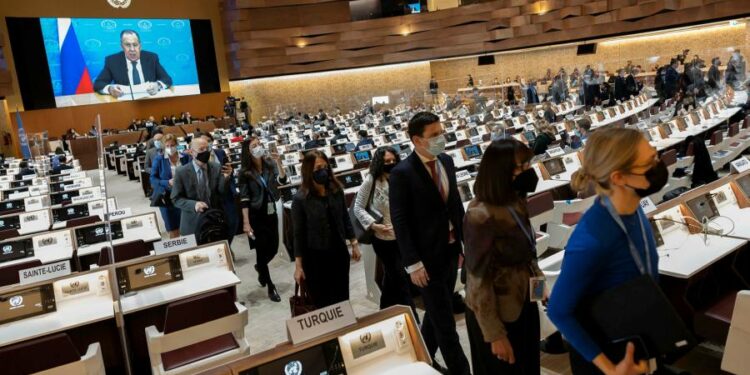The writer is a former FT Moscow bureau chief
The world had early and ominous warning of President Vladimir Putin’s violent intent towards Ukraine. Seven years ago, the Russian opposition leader Boris Nemtsov called for mass protests against Putin’s interventions in Crimea and the Donbas. “The primary reason for the crisis is that Putin launched a war policy that is insane, aggressive and deadly for our country,” Nemtsov told the Ekho Moskvy radio station in February 2015.
Three and a half hours later, Nemtsov was shot dead within sight of the Kremlin. Since then, Putin’s regime has systematically drowned out most signals of dissent: monopolising the output of the state-dominated television channels, shutting down independent civil society organisations, such as Memorial and imprisoning vocal opponents, most notably Alexei Navalny. This week, Ekho Moskvy, one of the last media outlets to air alternative views, was ordered to shut down, along with the Dozhd online news service.
Truth, it is often said, is the first casualty of war. But in Russia it was hospitalised long ago. Russian officials now even appear to relish goading their international counterparts with clear falsehoods. This week, Sergei Lavrov, Russia’s foreign minister, told a UN disarmament conference that it was Ukraine that had threatened Russia, prompting a walkout by about 100 diplomats. Lavrov’s argument that Russia had only intervened to prevent its neighbour from acquiring nuclear weapons, when Ukraine had already given up the world’s third largest stockpile in 1994 in return for Russian security guarantees, requires several mental backflips to make any sense at all.
The only audience that Putin really cares about, though, is the one at home. Indeed, the determination of the outside world to isolate Russia may only make it easier for him to persuade Russians to discount hostile foreign views. But there are three reasons why Russia’s information campaign could yet fail.
First, lies are hard to sustain. Reality has a nasty habit of intruding. Russia’s domestic narrative that its invasion of Ukraine would be swift and bloodless is demonstrably false. Thanks to the ubiquitous digital camera, the magnifying power of social media and the crowdsourced scrutiny of a global community, it is impossible to conceal the reality of the urban battlefield. Already, Russia has admitted to nearly 500 casualties.
Second, Ukraine is clearly winning its own information war at home and abroad. One of the most striking features of the conflict is that it pits two very different information systems against each other. Ukraine has mobilised civil society and there is collaboration between state and people. By contrast, the Russian state dominates almost all communication. It is a contest between a horizontal network and a vertical structure, between a choir and a megaphone. “The resilience of networks is much stronger,” says Gregory Asmolov, an internet expert at King’s College London. “Vertical information systems are extremely fragile.”
Third, Ukraine is now taking the digital fight directly to Russia. Ukrainians are the third biggest ethnic group in Russia and Ukraine’s President Volodymyr Zelensky has appealed in a televised speech to the Russian public in Russian. After being on the receiving end of Russian cyber attacks for eight years, Ukraine’s hackers are also responding in kind.
Hacken, a cyber security company formerly based in Kyiv, is running a bug bounty programme for global hackers to identify vulnerabilities in Ukraine’s systems and expose them in Russia’s. The company claims to have signed up 10,000 hackers from 150 countries. Some of these hacktivists aim to disrupt Russian media sites and push alternative Ukrainian views across social media. “The hacker community is so well organised. It is a real army,” says Dmytro Budorin, Hacken’s founder and chief executive.
For now, the Russian population may be mostly cowed and supportive of the Kremlin’s narrative but that makes the sporadic protests against the war all the more remarkable. More than 7,600 people have been arrested in demonstrations across Russia, according to OVD-Info. This week, Navalny echoed Nemtsov’s calls for more protests. “Putin is not Russia,” his team tweeted. “Let’s fight against the war.”
The nightmare scenario for Putin is that Russians increasingly disbelieve his narrative, which could signal the end of his regime. That still seems improbable for now. But the Ukrainian resistance has already shown its skill and courage in defying the odds. It may yet turn out to be Putin’s worst enemy because it knows his people best.











